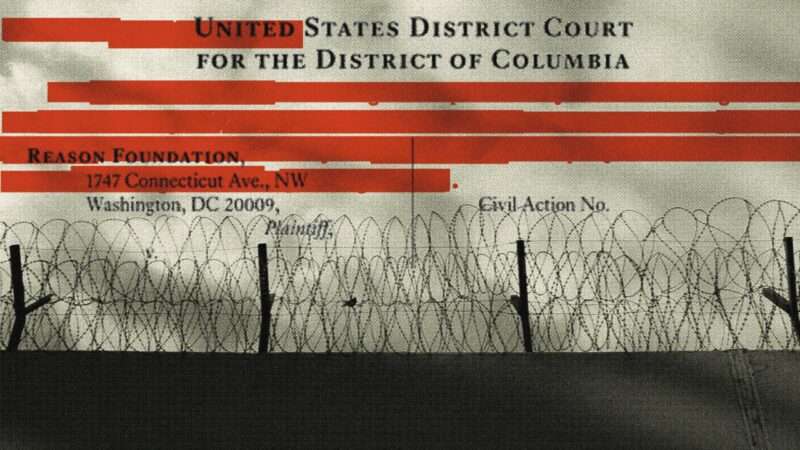
Reason is going to court to try to pry free records about whether women who died in federal prison received adequate medical care.
Reason Foundation, the nonprofit that publishes Reason, filed a Freedom of Information Act (FOIA) lawsuit in the U.S. District Court for the District of Columbia against the Bureau of Prisons (BOP) today, seeking medical reviews of in-custody deaths in two federal women's prisons. Reason is represented in the suit by the law office of Deborah Golden.
Reason reported in 2020 on allegations of fatal medical neglect inside FCI Aliceville, a federal women's prison in Alabama. Numerous current and former inmates, as well as their families, said in interviews, desperate letters, and lawsuits, that women inside Aliceville faced disastrous delays in health care. They described monthslong waits for doctor appointments and routine procedures, skepticism and retaliation from staff, and terrible pain and fear.
Seeking to learn more, Reason filed a FOIA request in May 2020 for inmate mortality reviews at Aliceville, as well as FMC Carswell, a federal prison in Texas that is the only medical center for incarcerated women in the BOP system.
Carswell has also been the subject of numerous allegations of medical neglect. Fort Worth Weekly published investigations in 2007 and again in 2012 detailing suspect deaths and abysmal medical care at Carswell. Reason spoke to a woman formerly incarcerated at Carswell who said she witnessed another inmate die while begging for medical attention:
In one instance, she says she was sitting in sick call when she saw a woman pushing another inmate in a wheelchair. The two were banging on the door, begging for someone to look at the woman in the wheelchair, but they were repeatedly told to sit back down.
"After about three times, she pushed the lady in the wheelchair to the restroom, which was just right around the wall from where we were sitting, and [the woman in the wheelchair] fell over and died of a heart attack."
"Had the staff paid attention in that moment instead of telling them to get away from the door and go sit down—you know, basically wait their turn—then the lady would still be alive."
Whenever a federal inmate dies, a committee reviews the circumstances, whether BOP policies were violated, and gives recommendations on how care could have been improved. That information could reveal whether the BOP is aware of medical neglect within its walls and how bad the problem is.
However, nearly three years later, Reason still has not received any records at all from Aliceville, and when the BOP finally released mortality reviews from Carswell in March of last year, it redacted any information that would indicate if there was substandard care, such as the review committee's findings on the timeliness and appropriateness of care; problems encountered during the medical emergency; whether there was adequate documentation in the patient's medical files; and whether the patient received appropriate care per the BOP's policies.

The BOP claimed the redacted portions were confidential under exemption b(5) of the FOIA, the so-called deliberative process exemption. The exemption was created so bureaucrats could have frank discussions about policy decisions—what are called "predecisional" communications— without worrying about their opinions being splashed in a newspaper. However, it has become one of the most abused exemptions in the federal government's arsenal, used as a catchall to hide anything embarrassing or indiscreet. The National Security Archive dubbed it the "withhold it because you want to" exemption.
Reason filed an administrative appeal challenging the redactions, but the Justice Department's Office of Information Policy upheld the BOP's response in December.
To be clear, there is nothing predecisional about these mortality reviews. They are conclusions about whether inmates received adequate healthcare and whether BOP policy was violated. And they concern one of the federal government's gravest constitutional responsibilities: ensuring that incarcerated people under its supervision aren't subjected to cruel and unusual punishment.
The Freedom of Information Act is supposed to be broadly construed to ensure public access to government documents, but frequently the only way private citizens and news outlets can get federal agencies to abide by the statute is to file a lawsuit.
The post <i>Reason</i> Files FOIA Lawsuit Against Bureau of Prisons for Inmate Death Records appeared first on Reason.com.





